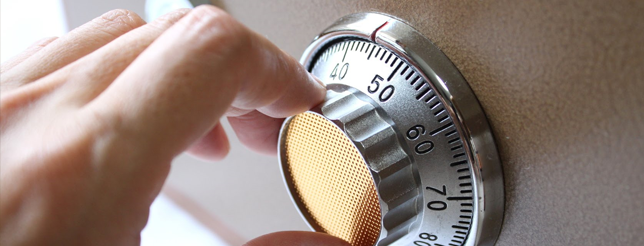Having large amounts of cash at home may keep you safe from online fraud and bank charges, but then there’s always an outside chance of fire or theft. So, for those who want to keep their cash at home, it’s far more sensible to invest in a decent safe.
1) Check your insurance policy
First off, it’s important to check the fine print of your contents insurance policy before deciding on the right way forward.
Most insurance providers will only cover a fairly small amount of cash in the home if it is not kept in a safe. So if there’s a fire or you’re robbed, you may find that you’re only covered for the first £250-£500, and you may well be underinsured.
Insurance providers will obviously make more concessions for money kept in a safe, as there will be less risk of a claim arising. However, as much as a safe is recommended for jewellery, personal family heirlooms and a modest amount of cash, it’s probably best not to keep your life savings in it.
2) How to choose the right safe
Firstly get a safe which is big enough for the volume of valuables you intend to put in it!
Beyond that, it’s worth considering just how robust the safe in question is. Every safe has a cash rating or a grade, which broadly indicates how secure it is.
So, for example, a safe with a cash rating of £6,000 will be tougher to break into than one with a cash rating of £1,000. Whatever cash rating it is the jewellery-valuables rating will be 10 times its cash rating.
However, it is important to bear in mind that this rating only tells you how secure a safe is considered to be… It does not necessarily have a bearing on how much of its contents will be covered by your insurance policy. So, before committing to buying a safe, check against your policy first. Some policies may cover you for a cash value beyond your safe’s rating, but some may cover you for less.
It’s possible to get lightweight, compact safes which you could store in your cupboard or attic and so on, these do cost more, for more heavyweight safes, you should follow the Safe Engineers advice on where to position it within your home.
You many need to anchor the safe to the ground or to a wall. That way, any opportunistic burglars won’t simply carry it away with a view to trying to open it later away from your property. Plus, a safe’s cash rating only applies when the safe is correctly installed.
Safes can be opened and locked in a variety of different ways, so it’s up to you to choose which method suits you best. You could go for a traditional key, an electronic type pad, or even one which recognises your fingerprint.
If you have any questions or would like to look into getting a house hold safe please feel free to contact me


Leave a Reply